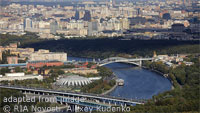The Moscow Front

(RFE/RL – rferl.org – Brian Whitmore – July 9, 2013) With Moscow’s election months away and the result likely predetermined, the next big showdown in the Russian capital should come as early as next week.
In the last couple days, more than 6,000 people have already joined a special Facebook page calling on Russians to gather on Moscow’s Manezh Square on July 18 to “discuss” the verdict in Aleksei Navalny’s controversial trial — which wraps up in a Kirov court that day.
City authorities, meanwhile, have warned the opposition against staging any unsanctioned rallies, adding that they would take “appropriate measures” to prevent them. Organizers of the Manezh event say Article 31 of the Russian Constitution guarantees their right to peacefully assemble and they don’t need any official permission to do so.
The ensuing standoff should mark a fitting end to Navalny’s highly politicized trial, which the anticorruption blogger has skillfully used to get his message out despite facing the prospect of a long prison sentence for charges widely seen as fabricated.
In his stirring closing statement last week, Navalny denounced what he called Vladimir Putin’s “feudal regime,” derided his trial as a bad “soap opera,” and said “nobody has the right to neutrality” in Russia’s ongoing political struggle.
And his message appears to be resonating.
According to a recent poll by the Levada Center, a strong plurality of Russians, 44 percent, believe the case against Navalny is political and was initiated in retaliation for his exposés of official corruption. Just 23 percent believe the charges against him have merit. In Moscow, a healthy majority, 57 percent, view the trial as political revenge.
Navalny, meanwhile, cleared the final hurdle this week to register as a candidate for Moscow’s September 8 mayoral elections. Given this, a conviction next week — as likely as one is — will appear even more politically motivated.
And although a conviction would disqualify him for running for office, Navalny has stubbornly insisted on carrying on with his campaign. On July 1, he unveiled his platform in a laid-back event that had the vibe of a U.S.-style roll out, using supporters in the room to illustrate various problems in the city’s governance and how he would address them.
The contrast with incumbent Sergei Sobyanin’s clumsy campaign kickoff is striking.
Shortly before announcing his decision to hold early elections, Sobyanin, a close Putin ally, decided to show voters how hip he was. He camped out in Moscow’s Jean-Jacques Cafe, a favorite venue of the capital’s “creative class,” and gave an interview to the weekly “Moskovskie novosti.”
The fact that Sobyanin thought such a move was necessary showed that authorities may be more worried about the September 8 elections than they are letting on. And the way it turned out showed why such concern might be well-placed.
To accommodate the mayor, the cafe had to be cleared out and closed, which didn’t exactly go over well with its patrons — the exact constituency he was trying to appeal to. And bloggers soon uncovered, and publicized, that a special throne-like chair was brought to the cafe from City Hall for a photo shoot accompanying the interview.
Sobyanin has also reportedly split his election staff into two teams. One will target working-class voters with traditional methods: showing Sobyanin solving urban problems and visiting construction sites. And another, as gazeta.ru reported recently, will target cool and trendy voters by showcasing projects like bicycle paths and the reconstruction of Gorky Park.
Try as he might, Sobyanin just isn’t going to appeal to Moscow’s hipster set — and he probably doesn’t have to in order to win. And the fact that he feels the need to do this speaks volumes.
“The minimum task is to prevent the mobilization of the creative class against Sobyanin and to demonstrate that he is not a symbol of the ruling regime,” political analyst Mikhail Vinogradov told gazeta.ru.
The capital is slipping — slowly but surely — from the Kremlin’s grip. And in many ways, the Moscow front is a harbinger of the battle for Russia.
Navalny will probably be convicted on July 18 and could be imprisoned for six years. But a strong majority of Muscovites and a healthy plurality of Russians believe the charges to be trumped-up.
The authorities will easily break up any rally that ensues to support Navalny and denounce the verdict, but that could only serve to further alienate the emerging middle class that represents Russia’s future.
And with the administrative resources and mobilization tools of City Hall at his disposal, Sobyanin will win election in September, whether Navalny is on the ballot or in prison. But he will do so with a growing critical mass in the capital hungry for change.
The authorities should win this round. But time is clearly not on their side.
Article copyright (c) 2013. RFE/RL, Inc. Reprinted with the permission of Radio Free Europe/Radio Liberty, 1201 Connecticut Ave., N.W. Washington DC 20036.
RFE/RL – rferl.org – article also appeared at http://www.rferl.org/content/navalny-sobyanin-moscow-politics/25041352.html
